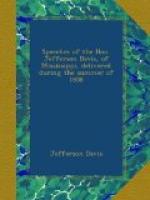his way to this place he learned that it was possible,
and he seized the occasion to visit the residence
of Gen. Knox, of revolutionary memory. His own
desire to see something which had been identified
with a patriot soldier who had so largely contributed
to the success of the revolution, and the establishment
of the institutions we inherited, was but an indication
of the military sentiment which lives in the American
heart. It turns the step of the traveller from
his direct path, it attracts the boy in his first
reading, it fires the ambition of the youth, and encircles
the veteran with the kindness of his neighbors, and
swells the train which follows his bier when, his
duty to his country performed, he answers the summons
of his God, and is translated to a better sphere.
It is that same military enthusiasm which calls you
from the avocations and the pleasures of home to the
duties and discomforts of the camp, that you may prepare
yourselves whenever your country needs it to render
her efficient service. On the militia of the country
the rights of its citizens, and the honor of its flag,
must mainly depend in the event of a war; they only
need to be organized and instructed to render them
a secure reliance. Mingled with the great body
of the people, identified with their feelings and
their interests, proud of the prowess of their fathers
and jealousy careful of the country’s honor,
if properly instructed and prepared, the first trumpet
call should bring from plain and from mountain a citizen
soldiery who would encircle the land and check the
invader with a wall of fire. Your plan of encampment
seems best suited to the purposes of practical instruction.
A pilgrim in search of health, his steps had been
fortunately directed to Maine, the courtesy of the
commander of this encampment had induced him to visit
it and to review the troops. In all respects
it had been to him most gratifying. The appointments,
the movements, the stern faces, and stalwart forms
of the men, spoke of the power to do, and the will
to dare whatever it was needful and proper to perform.
This day to manifest respect to a citizen of a distant
State, whose only claim upon them is that he has been
an American soldier, and is an American citizen, they
had cheerfully marched through heavy mire. So
much had they given to so small a demand on their
natural sentiment, he could not doubt they would with
equal alacrity, and with the same firm step, march
over a field miry with the blood of comrade and of
foe, where opposing causes make to men a common fate.
Among the objects which were of interest to him and which he had hoped to visit, was the fortification at the narrows of the Penobscot. During the last session of congress he had endeavored to obtain an appropriation for the completion of the work which had advanced to the point which made it effective against shipping, but left still liable to be carried by land attack. He was not of those who thought it necessary to raise walls wherever an enemy might




